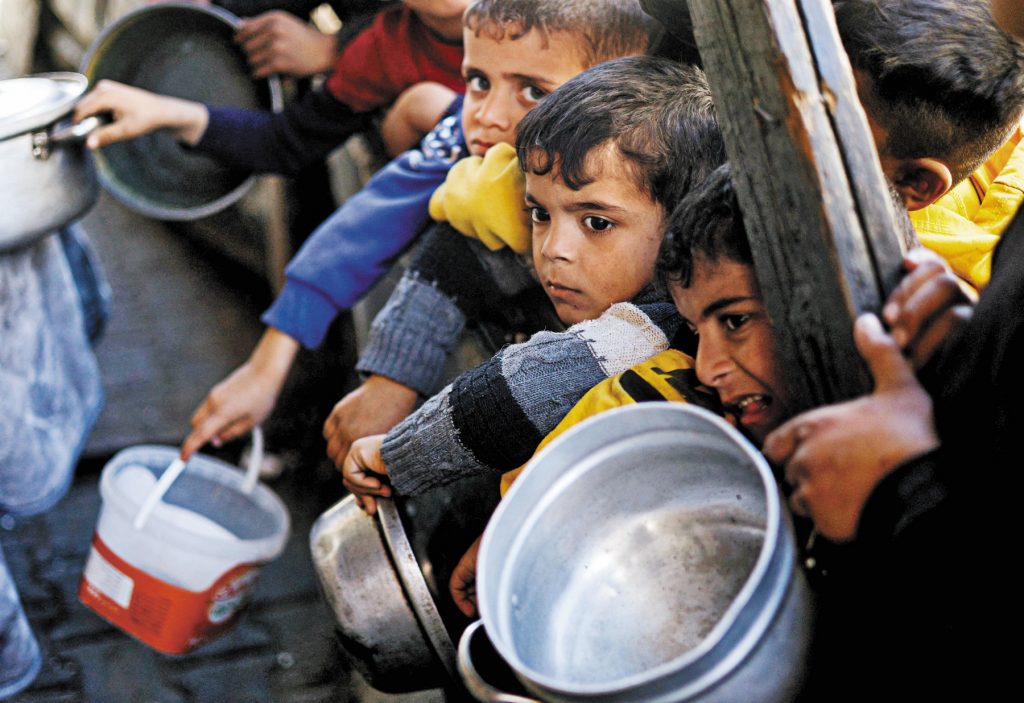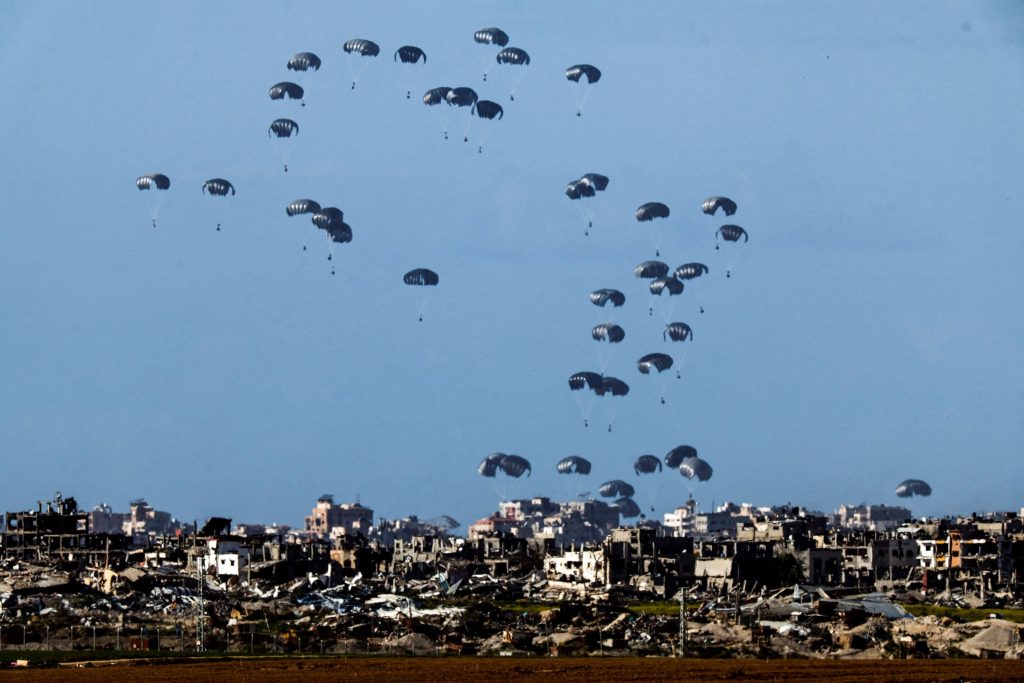WASHINGTON—An international push to disrupt Hamas financing has hit a roadblock over an effort to determine which charities are helping the militant group and which are legitimate nonprofits raising funds to address the humanitarian crisis in Gaza , according to Western officials.
The U.S., Israel and more than a dozen allies created a task force on terror financing following Hamas’s Oct. 7 attack on Israel . Since then, they have used sanctions to target Hamas financiers, currency exchanges and corporate networks, as well as offering multimillion-dollar bounties for information on financial facilitators.
But now, more than four months later, the U.S. has yet to act against many nonprofit groups that Israel says are run by Hamas, including charities in the U.S. and Europe. These groups have directed tens of millions of dollars to Gaza since the war began, according to current and former Western officials.
The U.S. and others have acted against a number of the organizations flagged by Israel, said a senior U.S. official, but in a lot of cases “allies have been asking for credible evidence for a long time, but are still waiting.”

Palestinian children wait to receive food cooked by a charity kitchen amid shortages of food supplies, as the ongoing conflict between Israel and the Palestinian Islamist group Hamas continues, in Rafah, in the southern Gaza Strip, March 5, 2024. REUTERS/Mohammed Salem
The disagreement over the charities comes as the U.S. pushes for a cease-fire in Gaza in the midst of mounting Palestinian deaths and a worsening humanitarian crisis, as well as a debate over Israeli allegations linking United Nations Relief and Works Agency staff to Hamas. Washington and other Western capitals suspended aid to Unrwa after Israel said 12 of the organization’s staffers were involved in the Oct. 7 Hamas assault.
The U.S. intelligence community has found it likely that some Unrwa workers took part in the attack but has so far not substantiated claims that a large number of the agency’s workers are tied to the militant group.
When it comes to the multitude of other organizations aiding Gaza, U.S. officials say they distinguish between real and fake charities, but are cautious of overreach that could target legitimate humanitarian nonprofits and play into Hamas propaganda.
“When we have credible evidence of sham charities that terrorists are using to raise or move funds, we will not hesitate to designate them,” the senior U.S. official said.
Hamas collects about $100 million a year from its chief benefactor, Iran, as well as revenue from a global investment portfolio and donations through nonprofit organizations abroad, according to Western officials. But Israel’s military operation has deprived Hamas of its biggest source of funding: the roughly $600 million a year the group collected in taxes in Gaza.
As a result, foreign funding, including from charities, is now critical for the group, Western officials say. “We are already seeing online grassroots campaigns, linked to so-called charities that we’ve previously designated, solicit funds under the guise of humanitarianism,” said Brian Nelson, the U.S. Treasury Department’s undersecretary for terrorism and financial intelligence.

Packages fall towards northern Gaza, after being dropped from a military aircraft, amid the ongoing conflict between Israel and the Palestinian group Hamas, as seen from Israel’s border with Gaza in southern Israel March 7, 2024. REUTERS/Amir Cohen TPX IMAGES OF THE DAY
The debate, however, centers around which charities are linked to Hamas and which are funding purely humanitarian work in Gaza. For example, Israel’s National Bureau for Counter Terror Financing, the Ministry of Defense unit responsible for disrupting terror funding, lists a number of fundraising campaigns hosted by Michigan-based LaunchGood, a nonprofit that crowdsources funding for some of the largest Muslim charities in the world.
LaunchGood hosts a Muslim Aid USA campaign and nearly two dozen other accounts that Israel says is tied to Hamas. It has also hosted campaigns for rebuilding Jewish cemeteries and for victims of the Pittsburgh synagogue shooting in 2018 .
The U.S. hasn’t taken action against any of the campaigns or charities on the fundraising platform. LaunchGood, which disputes Israel’s allegations, said it has established a vigorous compliance program in part because of the special scrutiny that Islamic groups have come under in the U.S.
“Every charity currently fundraising for Palestine has to pass three separate compliance checks, including independently audited financials and annual reports, screening of beneficial owners and directors, and continuous monitoring of programs and transactions by our compliance software, which was developed by former U.S. Treasury security officials,” said Chris Blauvelt, a co-founder.
The charities designated by Israel on LaunchGood’s site have undergone scrutiny by the Western governments that regulate them, Blauvelt said. In addition, the site offers visibility into the donors and the charities involved, promoting accountability, he added.
Islamic Relief Worldwide, a faith-based humanitarian and development agency and one of the charities hosted by LaunchGood that Israel says is linked to Hamas, has long disputed the allegation, first made by Israel in 2008. Christina Tobias-Nahi, a spokeswoman for Islamic Relief Worldwide, said the group “continues to stand by its statement published in 2014 , maintaining it is in no way linked to Hamas.”
Ten years later, “Israel remains unable to provide any evidence to substantiate this claim,” she said.
Tobias-Nahi said that over the past 15 years, the group has undergone 30 audits of its Palestinian operations, all of which “verified that funds and resources are used for the humanitarian purposes intended.”
Israel’s counterterror financing bureau didn’t provide details on the basis for the designations. But Israeli security officials say they have found social-media posts by the charities, their leaders and employees that express implicit and explicit support for Hamas, some even celebrating the Oct. 7 attack.
Jessica Davis, president of the consulting firm Insight Threat Intelligence and a veteran of Canada’s security services, said authorities are at risk of curbing legitimate aid because any nonprofit working in Gaza would have to interact with Hamas as the governing authority.
“We just need to be a little bit careful when we’re drawing too close of a line between those charities and Hamas and understand, Was it ideological support or was it out of necessity?” she said.
Part of the problem is that some Hamas-linked charities are essentially dual-purpose, said Daniel Byman, a former U.S. intelligence analyst. Hamas runs a large network of charities that fund hospitals, schools and other activities that have a humanitarian front but also supply its military, he said.
“It isn’t that the hospitals that Hamas runs are false-flag operations,” said Byman, now a senior fellow at the Washington-based Center for Strategic and International Studies. Rather, funds, personnel and supplies for the charitable work of Hamas are mingled with its military wing.
“They overlap tremendously,” he said.
Write to Ian Talley at Ian.Talley@wsj.com



